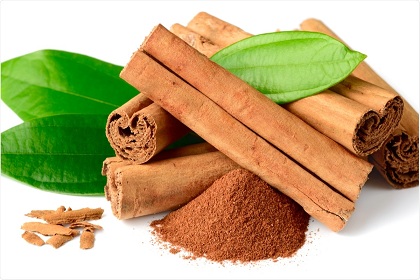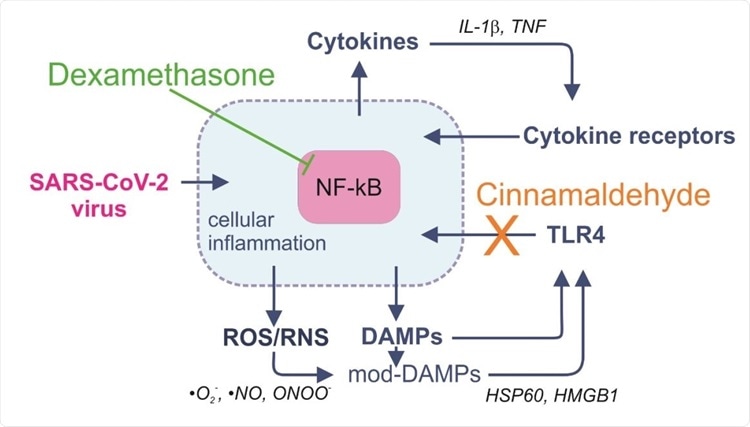COVID-19 Herbs: German-American Study Shows That Cinnamaldehyde From Cinnamon Is A Good Supplement With Dexamethasone For Treating COVID-19
Source: COVID-19 Herbs And Phytochemicals Jun 18, 2021 4 years, 7 months, 1 week, 4 days, 17 hours, 50 minutes ago
COVID-19 Herbs: A new study by scientist from Max Planck Institute-Germany, University of Witten/Herdecke-Germany, University Mainz-Germany and the Angiogenesis Foundation at Cambridge University-USA has found that Cinnamaldehyde from Ceylon Cinnamon is a good adjuvant with Dexamethasone for treating COVID-19 patients.

According to the study’s abstract, “Overshooting immune reactions can occur during inflammatory responses that accompany severe infections, such as COVID-19. Cytokines, damage-associated molecular patterns (DAMPs), and reactive oxygen and nitrogen species can generate positive feedback loops of inflammation, leading to long-term complications such as vascular endothelialitis, thrombosis, endothelial dysfunction, neurological impairments, and chronic fatigue. “
“Although dexamethasone can limit inflammation by inhibiting the activation of pro-inflammatory transcription factors, it has been found that high dose dexamethasone has undesirable side effects.”
The study team showed that Ceylon cinnamon and its major compound
cinnamaldehyde can mitigate inflammatory signaling in vitro. Cinnamaldehyde interferes with the dimerization of toll-like receptor 4 (TLR4), which can be activated by DAMPs like HSP60 and HMGB1.
The study results suggest that supplementary treatment with Ceylon cinnamon may allow administration of lower doses of dexamethasone to avoid high dose steroid side effects. Moreover, preliminary results indicate that Ceylon cinnamon modulates angiogenesis, which is a reactive phenomenon in COVID-19.
The study findings were published on a preprint server and are currently being peer reviewed.
https://www.biorxiv.org/content/10.1101/2021.06.16.448642v1
The study shows that dexamethasone can be administered at lower doses, thereby avoiding the side effects that occur with high doses of the steroid if cinnamon and cinnamaldehyde are used as adjuvants.
Although the corticosteroid dexamethasone is an effective treatment for moderate-to-severe COVID-19, it can cause unwanted side effects such as steroid psychosis, hyperglycemia, and secondary bacterial pneumonia due to immunosuppression.
There are even speculations that opportunistic dangerous fungal infections being seen in many COVID-19 patients at present in countries like India, Philippines, Indonesia and also in the Middle-east could be due to dexamethasome usage.
https://journals.sagepub.com/doi/full/10.1177/20499361211027065
The study team demonstrated that Ceylon cinnamon and its major compound cinnamaldehyde can dampen inflammation via a pathway that is distinct from that of dexamethasone.
Lead author Dr Kurt Lucas from Max Planck Institute for Chemistry, Multiphase Chemistry Department suggest that the two compounds may have synergistic effects when administered concomitantly that would allow dexamethasone to be administered at lower doses.
The study team also provided preliminary evidenc
e that Ceylon cinnamon modulates angiogenesis ie a reactive phenomenon that occurs in COVID-19.
The team said that to the best of their knowledge, no studies investigating the use of cinnamon alone or in combination with dexamethasone in the treatment of COVID-19 have been published to date.
Dr Lucas told Thailand Medical News, “Clinical studies are therefore needed before the treatment of COVID-19 patients with cinnamon, or its compounds can be recommended.”
It has been found that the long-term effects of the acute inflammatory responses that can occur with COVID-19 include neurological disturbances, chronic fatigue and myocardial disorders.
The ‘ultra’ excessive immune reactions that can lead to these complications are often referred to as the “cytokine storm.”
It is now known that various inflammatory cytokines are involved in this overshooting of the immune reaction, including tumor necrosis factor (TNF), interferon- γ (IFN-γ), interleukin 1β (IL-1β), IL-2, IL-4, IL-6, and IL-8.
Furthermore the pro-inflammatory transcription factor nuclear factor kappa-light-chain-enhancer of activated B cells (NF-κB) also plays a key role, regulating the expression of hundreds of inflammatory genes.
Also damage-associated molecular patterns (DAMPs) may be released that can activate pattern recognition receptors such as toll-like receptor 2 (TLR2) and TLR4. These pattern recognition receptors generate additional positive feedback via NF-κB that causes further cytokine release.
 Positive feedback loops amplifying the magnitude of inflammatory signaling. Pro-inflammatory cytokines cause activation of NF-κB, which amplifies their production, resulting in a positive cytokine feedback loop. In addition, DAMPs can be released and activate NF-κB via TLR4 and other pattern recognition receptors, generating a further feedback loop. Moreover, interactions with ROS/RNS can form chemically modified DAMPs (mod-DAMPs) with enhanced TLR4-stimulating potential, additionally fueling inflammation. Dexamethasone inhibits activation of NF-κB, whereas cinnamaldehyde, the major active compound of ethanolic Ceylon cinnamon extract, inhibits activation of TLR4, thus disrupting the feedback loops.
Positive feedback loops amplifying the magnitude of inflammatory signaling. Pro-inflammatory cytokines cause activation of NF-κB, which amplifies their production, resulting in a positive cytokine feedback loop. In addition, DAMPs can be released and activate NF-κB via TLR4 and other pattern recognition receptors, generating a further feedback loop. Moreover, interactions with ROS/RNS can form chemically modified DAMPs (mod-DAMPs) with enhanced TLR4-stimulating potential, additionally fueling inflammation. Dexamethasone inhibits activation of NF-κB, whereas cinnamaldehyde, the major active compound of ethanolic Ceylon cinnamon extract, inhibits activation of TLR4, thus disrupting the feedback loops.
It is common knowledge that Dexamethasone can limit inflammation by inhibiting the activation of NF-κB. However, corticosteroids are well known for their unwanted side effects such as steroid psychosis, hyperglycemia (particularly in diabetic patients), and secondary bacterial pneumonia or invasive fungal infection due to immunosuppression.
Dr Lucas added, “Cinnamon has been used as a medicine for thousands of years in traditional medical practices and its anti-inflammatory effects are well documented. The inhibition of TLR4 dimerization, in particular, is an important anti-inflammatory mechanism.”
The study team hypothesized that Ceylon cinnamon (CCE) or its major compound cinnamaldehyde (CA) could be a useful supplementary treatment in COVID-19 for reducing the cytokine storm risk and allowing reduced doses of dexamethasone.
The team compared the effectiveness of CCE, CA and dexamethasone at suppressing the messenger RNA (mRNA) production of the TLR4-dependent cytokines IL-1β, IL-8, and TNF in vitro.
The study team incubated Tamm-Horsfall Protein 1 (THP-1) monocytes with 0.2% and 0.3% concentrations of CCE, equivalent ethanol concentrations, dexamethasone 3.2 µm or.4 µm, or various concentrations of CA. After two hours, the cells were challenged with 50 ng/mL lipopolysaccharide (LPS) and incubated for a further one to four hours. mRNA was then isolated and quantified by quantitative polymerase chain reaction.
Significantly the expression of cytokine genes was drastically inhibited by CCE. Treatment with 0.3% CCE drastically inhibited LPS-stimulated increases in the mRNA expression of all three cytokines after just one hour, while the ethanol concentrations had no impact on gene expression.
It was discovered that the inhibitory effects of 3.2 µm and 6.4 µm dexamethasone were not as strong as CCE after one hour but were similar to CCE after four hours.
Interestingly the CA also showed a clear dose-dependence in reducing the mRNA expression of all three cytokines.
The team found that concentrations of 30 µm CA and 3.2 µMm dexamethasone were similarly potent in suppressing inflammatory signaling.
It was also found that the effect of 30 µm CA on IL-1β and TNF expression was comparable to that of CCE, but the effect was less pronounced for IL-8.
Dr Lucas further added, “Overall, whole CCE seems to be more efficient than CA at suppressing the mRNA expression of inflammatory genes. Taken together, CCE and CA can dampen the activation of TLR4-dependent pathways during inflammation.”
It must be noted that reactive angiogenesis is another complication that occurs in cases of COVID-19. The study team therefore, carried out a tube formation assay in HUVEC cells – a common model for angiogenesis – to determine whether CCE can also mitigate this complication
In contrast to controls, 0.1% CCE attenuated tube formation after 3.5 hours, whereas 0.5% and 1.0% CCE elicited cytotoxic effects.
The study team said that unlike dexamethasone, which inhibits the activity of NF-κB, cinnamon can suppress the secondary activation of TLR4 by DAMPs. Since the two compounds dampen inflammation via distinct pathways, they are likely to have synergistic effects when administered concomitantly.
The study team said that future studies may pave the way for clinical studies of cinnamon derivatives for the treatment of COVID-19.
Dr Lucas concluded, “Our study findings suggest that intake of Ceylon cinnamon in combination with dexamethasone may prevent the ‘cytokine storm’ and help reduce the dosage of dexamethasone to mitigate its side effects. Preliminary results also indicate that cinnamon may reduce angiogenesis.”
Thailand Medical News would like to stress that in its new Therapeutic Tea formulation, (Version 4.1) which in
informal observational studies are showing to be highly effective both as a prophylactic and also as a therapeutic against emerging variants including the second and third generation variants of the various VOCs, cinnamon is also incorporated in the formulation of more than 25 herbs and phytochemicals. The teas are not available for sale at the moment but are given free with every minimum donation of US$2,000. For details, email to :
therapeuticteas19@gmail.com
For more on
COVID-19 Herbs, keep on logging to Thailand Medical News.

